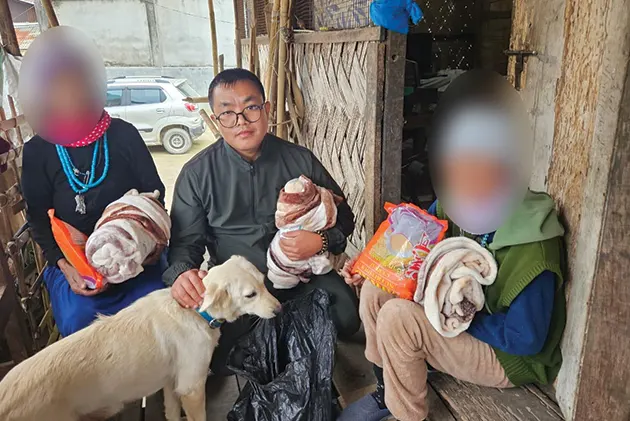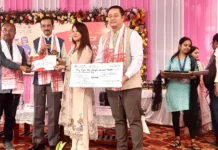[ Tarannum Ansari ]
Social activist and chairman of the Arunachal Life Saving Foundation, Ramesh Jeke, began his journey of social work and helping others at the young age of 16, driven by a personal experience that deeply moved him.
Since 2008, he has been a dedicated social worker in Arunachal Pradesh. His tireless efforts include organising blood donation drives, helping abandoned elderly people, and supporting underprivileged children’s education.
In this interview, Ramesh Jeke shares his journey, the challenges he has faced, and his commitment to helping those in need.
Tarannum Ansari: Has there been any life incident that inspired you to start working for the needy people?
Ramesh Jeke: I started my journey in 2008. There was not a particular inspiration, but an incident that happened to me when I was 16 years old. I wanted to donate blood, so I went to the general hospital in Naharlagun (now TRIHMS). When I arrived, I saw the terrible condition of the blood bank in the hospital and the lack of storage facilities. I asked myself, how will people survive if there is no blood? People will die. I was not allowed to donate blood as I was not 18. However, later in the evening, I returned to the hospital, lied about my age, saying I was 18, and I donated blood.
I was determined to donate. After stepping out of the blood bank, I saw a mother crying.
I asked her why she was crying, and she told me that her five-year-old daughter needed to be operated on and the doctor said that she needed three units of blood immediately. The blood bank had no storage, and since I had already donated, I couldn’t help her. I tried to convince many people to help, but no one did. The five-year-old girl died.
The mother was holding her daughter and crying, and it deeply affected me. I realised that many people who come from various districts or villages of the state to the capital for treatment die due to lack of blood. This incident disturbed me mentally for two days. I started researching when brokers were openly selling blood to the hospitals at very high prices.
Seeing all this, I started the Arunachal Live Saving Foundation on 26 November, 2008. For me, the tears of that mother were the reason I began this work.
TA: Do you work alone, or do you have a team?
RJ: I started individually, but soon realised that I wouldn’t be able to accomplish much alone, so I started building one. I visited college hostels, PG accommodations, rental houses, where I could find motivating and convincing people. Gradually, young minds started joining me, and that’s how our team was formed.
Once we had a team, everyone suggested that we should have a name. Initially, we started with ‘Vivekananda Yuva Shakti’, because I was inspired by the teachings of Swami Vivekananda. Later, we changed it to ‘Arunachal Vivekananda Yuva Shakti’ to better represent our state. Eventually, we decided on the name ‘Arunachal Voluntary Blood Donors Organisation’ because it reflected our mission and represented our state. This is how our team came into being.
TA: Apart from actively volunteering for blooddonation, when did you begin helping elderly people and what motivated you to take up this cause?
RJ: While I was running a blood donation drive, I encountered an abandoned mother in Naharlagun in 2013. Her own children had left her. Seeing her plight deeply affected me, and I realised that there were many elderly people in similar situations. This experience motivated me to start rescuing abandoned elderly individuals and providing them with the medical care and support they needed. Since then, I have been dedicated to ensuring that elderly people receive the care and respect they deserve.
TA: You also undertake the responsibility of performing the last rites of the unclaimed bodies and those who are abandoned. Could you share more about how you are involved in this compassionate work?
RJ: Certainly. Many individuals face circumstances where they lack the basic financial assistance. As I worked closely with hospitals, I got to know that there are many unclaimed dead bodies. The situation compelled me to step in. I felt the need to respectfully perform the last rites.
I started performing the last rites for these abandoned bodies as a way to provide them with dignity in their final moments. Over time, this effort has grown, and I have personally performed the last rites for 110 individuals so far. Each ceremony is a solemn reminder of the importance of compassion and respect for every human life, regardless of their circumstances.
TA: How do you gather funds to support the initiatives?
RJ: I do not receive any formal funding for this. Often, patients who pass away leave behind unused medicines. These medicines typically remain unused at homes, so I started collecting them door-to-door and using them for the treatment of needy individuals. Additionally, in Itanagar, many parties and events result in surplus food, which would otherwise be thrown away. I began collecting this surplus food and distributing it to those who don’t have enough to eat.
Observing these needs, I also renamed my organisation to Arunachal Life Saving Foundation. Under this foundation, we conduct blood donations, assist abandoned elderly individuals, perform cremations and burials for unclaimed bodies, and collect medicines door-to-door. I have also started supporting seven children in their education.
This year, on the occasion of the World Blood Donors’ Day, the Arunachal Life Saving Foundation and the Itanagar capital police collected 260 units – the highest units to be collected within a day. It was in collaboration with the VKV Alumni Association Arunachal Pradesh and the blood banks of TRIHMS and RK Mission Hospitals.


